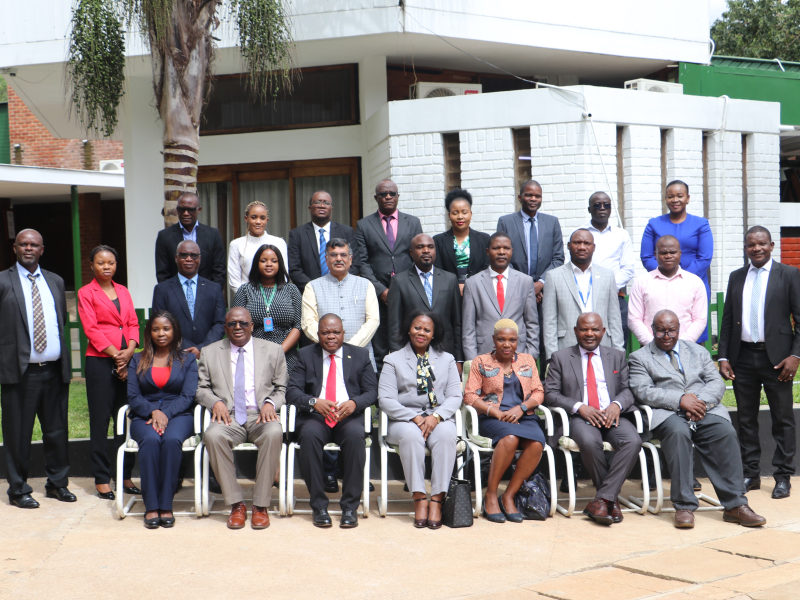Lilongwe, Malawi, 1 April 2025 (ECA) - Malawi’s Ministry of Trade and Industry (MoTI), supported by the United Nations Economic Commission for Africa (ECA) Sub-Regional Office for Southern Africa (SRO-SA), organised a meeting to review and validate the draft regulations for Special Economic Zones (SEZs) in the country on April 1 2025 in Lilongwe.
The validation meeting was attended by representatives from MoTI, Malawi Investment and Trade Centre, Reserve Bank of Malawi, SEZ Board, the private sector, development partners, Government regulatory agencies, the United Nations System in Malawi, academia and ECA SRO-SA.
ECA recognizes SEZs as powerful tools for structural transformation and inclusive industrialization and is supporting Malawi to leverage these zones to promote industrial diversification, value addition, and regional integration under continental frameworks such as the African Continental Free Trade Area (AfCFTA) agreement.
The meeting was officially opened by Ms. Christina Zakeyo, Secretary for Trade and Industry who noted that for the government of Malawi, the establishment of SEZs is a key strategy towards supporting economic growth, diversification and industrialisation. She underscored that SEZs have been proven to be effective in attracting foreign investment, promoting exports, and creating jobs in many countries and Malawi seeks to leverage these zones. She emphasized that, “developing regulations for Special Economic Zones is crucial to attract investment and promote economic growth by outlining specific investment incentives offered to businesses operating within the zones, such as tax exemptions, subsidies, and streamlined regulations”. She underscored the need to develop an implementation plan and a monitoring and evaluation framework to accompany the regulations once they have been adopted.
Oliver Maponga, Economic Affairs Officer, representing ECA, informed the participants that as an industrial development strategy, SEZs provide an opportunity to grow value chains through value addition and beneficiation and thus support industrial development and socio-economic transformation. He focused on three areas through which SEZs can support accelerated industrialization and development in Malawi which include: providing micro, small and medium enterprises a unique opportunity to integrate into larger industrial value chains in the zones; leveraging the AfCFTA by scaling up production, enhancing competitiveness, and taking advantage of preferential trade terms under the agreement and the fact that SEZs give Malawi a chance to move beyond raw material exports and tap into the high-value green minerals supply chains through supporting beneficiation of Critical Energy Transition Minerals.
Rebecca Adda-Dontoh, United Nations Resident Coordinator for Malawi, in remarks delivered by Michelle Hughes, the Head of the UN Resident Coordinator’s Office, acknowledged the support of the United Nations in Malawi in various areas and specifically elaborated on ECA’s recent and ongoing technical support, including: the development of Malawi’s new National Industrial Policy, which was validated in May 2023 and remains to be launched; the review and development of Malawi’s Foreign Policy and its Strategic Plan on Economic Diplomacy aimed at positioning the country in regional and global trade and investment landscapes; the development of a robust digital public infrastructure to improve policy monitoring, economic data tracking, and government efficiency in decision-making and emphasised that, “Malawi is one of the beneficiary countries of a project on Innovative Climate Action for Green and Inclusive Industrialization aimed at building the capacity of policymakers to develop green economy policies and incentive frameworks that foster climate action and sustainable industrialization”.
Kruger Phiri, the Director General of Malawi Investment and Trade Centre (MITC), in remarks delivered by Lovemore Ndege, Acting Director for Trade Facilitation, MITC, reminded the meeting that the SEZ regulations will support the implementation of the Special Economic Zones Act. “The Special Economic Zones Act was assented in January 2024 and brought into force in March 2024. This Act allows provision of more liberal economic laws than those that are prevailing in the country and designated Malawi Investment and Trade Centre as the Special Economic Zones Authority in Malawi”.
The opening session was followed by the presentation of the Draft Special Economic Zones Regulations by George Naphambo, the ECA Consultant. In his report, the Consultant drew on lessons from the implementation of Export Processing Zones Programme such as failure by the programme to diversify Malawi’s export portfolio; failure to create sustainable long-term jobs; minimal impact on Foreign Direct Investment flows; limited impact on manufacturing sector; insignificant net forex flows and erosion of corporate incentives in developing the regulations. The Draft regulations, elaborated in 15 (fifteen parts), provide comprehensive guidance and are aligned to national development aspirations and other national policies and strategies.
This was followed by thematic group work and panel discussions on the review of the draft regulations in order to improve the content and to define a clear roadmap for the finalisation and implementations of the SEZ regulations.
Issued by:
Communications Section
Economic Commission for Africa
PO Box 3001
Addis Ababa
Ethiopia
Tel: +251 11 551 5826
E-mail: eca-info@un.org
